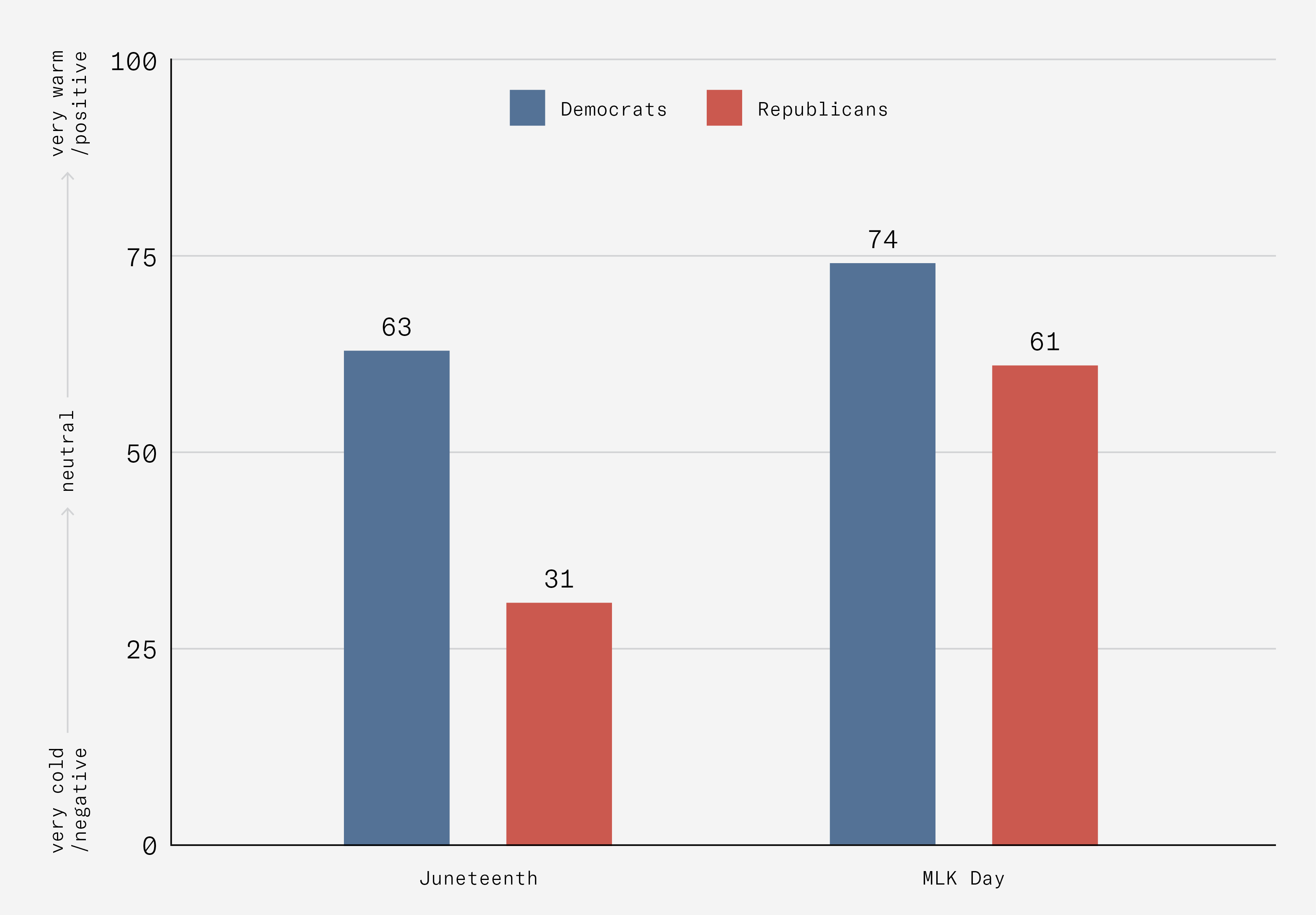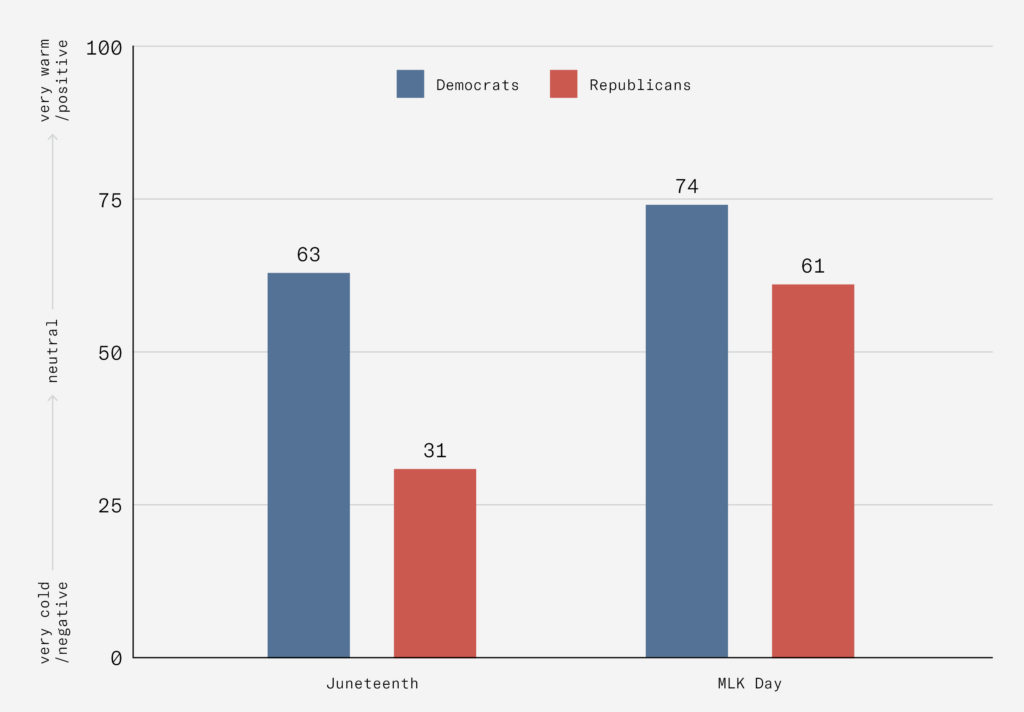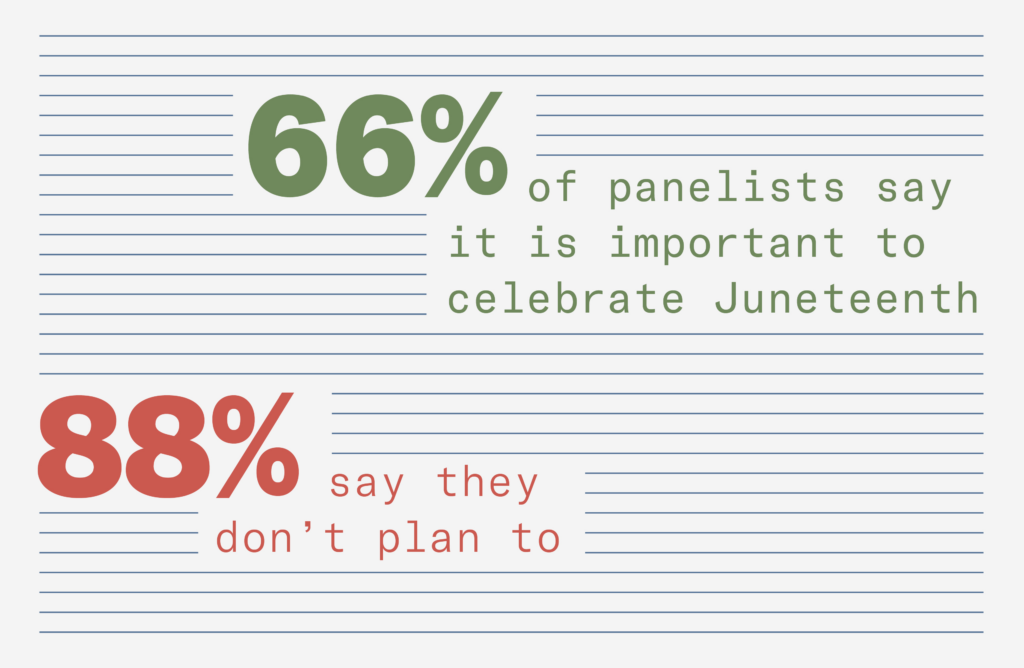June 17, 2022
A closer look at Juneteenth
More in Common US

Summary: As a new federal holiday celebrating liberation and equality, Juneteenth provides an opportunity for unity and healing. But Americans are unsure of how to celebrate it, making it vulnerable to polarization.
Democrats and Republicans feel very differently about Juneteenth, revealing vulnerabilities to polarizing narratives.
The following shows the responses, averaged, of N=2,500 Americans to the question: How cold or warm do you feel towards the following holidays?1

However, conversations with a broad range of Americans suggest that Juneteenth represents an opportunity to unite people around shared values.
When we asked our online research community of 280 Americans about their perceptions of Juneteenth, a more complex narrative emerged.2
While the vast majority (66%) of panelists say it is important for the country to celebrate Juneteenth, nine in ten (88%) say they are not going to celebrate or are not yet sure about celebrating.
“It is a significant historical marker, but I’m not sure how to celebrate it.”
💬 Michael, Age 45-54, White male, Moderate, Missouri
“I just heard about this a year ago, so I am not that familiar with it. I saw a movie celebrating this month. I really don’t know. Maybe have a documentary about it to really educate people about this important holiday.”
💬 Rosalie, Age 55-64, Black female, Moderate, Louisiana
“I’m not sure how politicized Juneteenth is, or if it is even politicized at all, but people should always be respectful towards one another. As far as I know, I have never seen the nation celebrate Juneteenth. It could be important to celebrate, but I genuinely have no idea how important it is or isn’t.”
💬 Clyde, Age 18-24, White male, Progressive Activist, Florida

Why should we act?
Social science research suggests that collective rituals—including those centered around national holidays—can be important sources of social cohesion in groups. When groups celebrate shared values together, it can lead them to feel more connected, and more likely to cooperate in the future.
Furthermore, the celebration of Juneteenth and the potential recognition of historical and present injustices signaled by the federal holiday could be a meaningful step towards creating a more inclusive narrative of “us,” where the story of African American emancipation is more deeply woven into the story of America.
However, in order to achieve these goals, we need healthy social scripts for communities to follow on how to honor Juneteenth. And, we need to write those scripts now—before scripts written by those seeking to divide Americans take hold.
“The country should first educate people on what happened so they can understand Juneteenth. After educating, they should celebrate it just like July 4th.”
💬 Joyce, Age 45-54, Black female, Moderate, Florida
Recommendations
👉 Many Americans are learning about Juneteenth for the first time and are not thinking about the holiday through an ideological lens. When teaching about Juneteenth, emphasize areas of common ground and connect the creation of a new federal holiday to a broader national story of freedom. Highlight shared American values of achieving liberation and opportunity for all, and remind Americans of our common commitment to learning our nation’s full history, including both our history of racism and our history of progress.3
👉 Although Juneteenth is a new federal holiday, African American communities have celebrated this day for over a century. Over 7 in 10 African Americans say the holiday is significant to them personally.4 Lifting up personal stories from Americans about how and why Juneteenth holds meaning is a powerful way to depoliticize the holiday. Avoid relying too much on academic framings or abstract concepts. Focus instead on individual stories, which tend to be the most persuasive.
👉 Magnify places that are creating new rituals to celebrate and honor Juneteenth in ways that both acknowledge its unique meaning to African Americans and bring diverse groups of Americans together.5
👉 Embrace narratives that highlight both progress and failures on racial equality. Americans recognize that racism is an ongoing problem and are proud of the steps the country has taken to try to eradicate it.6 Talking about current failures as well as past accomplishments bolsters the likelihood that Americans unfamiliar with Juneteenth will perceive the holiday as a unifying national endeavor.
📊 Read our full report on Juneteenth!
📝 Read our op-ed on Juneteenth!
📩 Leave your email here if you want to collaborate with us on creative content, research, or op-eds.
1 From online survey interviews with N=2,500 adult US citizens conducted with our partner YouGov from May 17 to June 3, 2022. For a full description of the methodology, see our report on Juneteenth.
2 The online research panel includes approximately representative distributions of Americans along lines of gender, age, race, political party, educational level, and geographic region. Our Juneteenth questions were fielded from May 31 to June 6, 2022. Responses were then analyzed and reviewed for representative quotes. Names have been changed to protect the respondents’ privacy.
3 7 in 10 Americans feel it is important that we learn about our history, including the history of Americans with similar and different racial backgrounds; and 9 in 10 Americans feel that American identity is defined by the ideals of freedom and opportunity, according to our survey findings.
4 From our June 2022 survey, as detailed in our report on Juneteenth.
5 An example: The Juneteenth Community Celebration at the Eiteljorg Museum in Indiana.
6 See our 2020 report, American Fabric: Identity and Belonging, for more details.